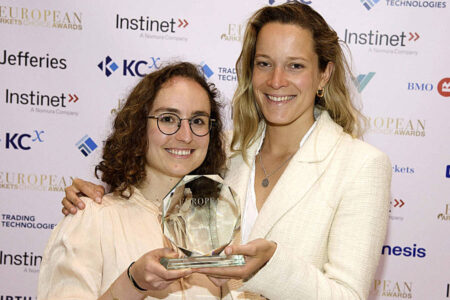
Genesis Global received the Best Tool for Trading Efficiency award at this year’s European Market’s Choice Awards. Stephen Murphy, co-founder and CEO, spoke to Global Trading about the company’s performance this year and how clients have responded.
What has driven your success this year?
We took a series of bold steps this year to make the Genesis Application Platform much more accessible, and to make it easier for financial firms to test and onboard our technology. First, using new tools, users can see the power of the platform at first glance. Next, we transformed testing with a free trial program, so that users experience Genesis by rapidly building applications addressing their own use cases. Finally, for firms ready to use the platform in a production environment, we implemented usage-based pricing to correlate clients’ costs to the value they receive from Genesis. Together, these advances deliver that “eureka” moment when clients grasp the platform’s capabilities and streamline how they make our technology a pillar of their digitalisation strategies.
We are also rolling out product enhancements more quickly. June marked the start of formal monthly releases that deliver upgrades to the platform’s development suite, runtime environment and component marketplace. We want to make developers as productive as possible, and our rapid cadence for releases ensures we continuously arm them with new capabilities.
How have you focused investment to support this growth?
We have invested heavily this year in tools that help developers get up and running on Genesis and bolster how the platform accelerates building complex financial applications. For example, Create is a new web-based tool which lets users build applications in minutes by configuring business objects, data sources, data queries and UI foundations.
It’s code-free, but interacts directly with the platform, so you can start very robust applications. It is a great way for developers to learn our platform and experience for themselves how Genesis can help them get from whiteboard to market ten times faster than traditional coding. It also allows users to build and reconfigure prototypes, virtually in real time. This is useful when an application has multiple types of users; Create allows the developer to iterate in a proof of concept to drive engagement from business stakeholders.
Another game-changer for developers is the Marketplace, a library of pre-built solutions, templates, components and integrations within the platform which users can import into their projects. Users have access to more than 30 integrations covering market data feeds (Bloomberg, Refinitiv, S&P Global), trade and portfolio systems (Murex, Fidessa, Geneva) and a range of service providers (CTM, Pershing, SS&C).
The Marketplace dramatically accelerates developer productivity because users are simply importing the functionality they need into their projects, rather than building things like data integrations time and time again from scratch.
Complete solutions from Genesis are also part of the Marketplace. These include robust applications for trade allocation, real-time matching, primary markets investing, custody functions, credit insurance and wealth management. From any other vendor, these would be stand-alone products. We’re different. With Genesis, clients have direct access to almost everything we have built, offering a force multiplier for the industry. Of course, users can also customise these solutions with the platform, but they have a profound advantage in leveraging applications prebuilt by Genesis. We continuously add new elements, including large-scale solutions, to the Marketplace.
What has been the response from the industry?
Financial markets firms are under tremendous pressure to boost revenue, control costs and reduce risk. While technology is a key strategic lever, it’s highly complex for most firms to modernise and digitalise, in part, because they run on an interdependent set of legacy technologies. Maintaining existing technologies is a massive drain on resources and as a result, according to Gartner, most firms only invest 11 percent of their IT budget on new, innovative technology.

We lived in that world for a very long time and founded Genesis because we knew that the industry needed a new way to write financial markets grade software.
Clients use Genesis to supercharge six business strategies. Three aim at containing, extending or replacing legacy systems. First, to help financial firms limit dependencies on vendors, we facilitate flexible “scaffolding” around vendor systems. This gives firms the ability to extend the functionality of vendor platforms while creating options to migrate from third party solutions. Second, some legacy technologies need to be enhanced, not replaced. Our ability to integrate with a range of systems makes Genesis uniquely powerful in building new capabilities driven by core systems, helping clients to adopt a best-of-breed approach in their technology selection. Third, Genesis has unmatched ability to help firms quickly and cost-effectively replace end user computing and manual processes, including reliance on spreadsheets, with robust, auditable applications.
To enable new revenue through faster innovation, the Genesis platform makes application development faster and easier and empowers generalist developers to build specialised software. In addition to dramatically accelerating back- and front-end coding, the platform’s embedded runtime environment ensures that compliance, security, resilience and processing power are all financial markets grade. Similarly, these attributes make Genesis a natural foundation for building new high-performance market infrastructure. Octaura, the first electronic trading platform for syndicated loans and CLOs, and Neptune, the fixed income market data hub, are examples of Genesis powering market-changing services.
Finally, improving developer productivity is a critical use case, especially given the cost and scarcity of engineering talent. Enabling developers to build with speed and quality while maintaining rigorous controls helps firms realise their innovative potential. Leading banks are benchmarking engineering productivity, measured by speed to deliver product features, agility and stability of new technology. Genesis delivers across those and other productivity metrics.
©Markets Media Europe 2024

